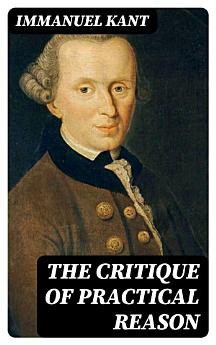The Critique of Practical Reason
Immanuel Kant
maj 2022 · DigiCat
E-bok
315
Sidor
family_home
Kvalificerad
info
reportBetyg och recensioner verifieras inte Läs mer
Om den här e-boken
In "The Critique of Practical Reason," Immanuel Kant meticulously explores the foundations of moral philosophy, presenting a thorough analysis of the nature of practical reason. Written in 1788 as the second of his critically acclaimed works, this treatise expounds upon the principles of ethics through a rigorous examination of human autonomy and the concept of duty. Kant's distinctive style, characterized by dense, yet eloquent prose, invites readers to engage deeply with his argumentation, which is firmly rooted in Enlightenment ideals, asserting that moral law is inherent to rational beings and can be apprehended through reason alone. Immanuel Kant, a pivotal figure of modern philosophy, was profoundly influenced by the scientific developments and philosophical debates of his time. His earlier works laid the groundwork for his ethical framework, emphasizing the importance of rationality and freedom in moral actions. Growing up amid the tumultuous changes of the late 18th century, Kant's thoughts reflect a synthesis of empirical observation and rational inquiry that continues to inform contemporary discussions on morality and ethics. This book is indispensable for anyone seeking to understand the intricacies of moral reasoning, as it not only elucidates Kant's ethical theories but also challenges readers to contemplate their own moral agency. Scholars, students, and enthusiasts of philosophy will find "The Critique of Practical Reason" to be a profound source of insight into the perennial questions surrounding duty, morality, and the role of reason in ethical decision-making.
Om författaren
Immanuel Kant (1724-1804), a central figure in modern philosophy, was born in Königsberg, Prussia (now Kaliningrad, Russia). He spent his entire life within the boundaries of this small university town, leading many to characterize his life as outwardly uneventful. However, the intellectual journey he undertook revolutionized philosophical thinking and continues to influence a broad spectrum of disciplines. Kant's 'The Critique of Practical Reason' (1788), the second of his critical works, delves into moral philosophy and sets the foundation for his moral theory, which pivots on the concept of the categorical imperative. This work follows his most famous book, 'The Critique of Pure Reason' (1781), which addresses the limitations and scope of human understanding. Known for his rigorous and systematic approach to philosophical problems, Kant sought to reconcile rationalism and empiricism and his ideas about autonomy, the moral law, and the nature of the human being as an end in itself had a profound impact on later philosophical thought and ethical theory. His style is characterized by a meticulous and often complex exposition of his thoughts, which has led to the development of a vast body of Kantian scholarship aimed at interpreting and analyzing his substantial contribution to philosophy.
Betygsätt e-boken
Berätta vad du tycker.
Läsinformation
Smartphones och surfplattor
Installera appen Google Play Böcker för Android och iPad/iPhone. Appen synkroniseras automatiskt med ditt konto så att du kan läsa online eller offline var du än befinner dig.
Laptops och stationära datorer
Du kan lyssna på ljudböcker som du har köpt på Google Play via webbläsaren på datorn.
Läsplattor och andra enheter
Om du vill läsa boken på enheter med e-bläck, till exempel Kobo-läsplattor, måste du ladda ned en fil och överföra den till enheten. Följ anvisningarna i hjälpcentret om du vill överföra filerna till en kompatibel läsplatta.








